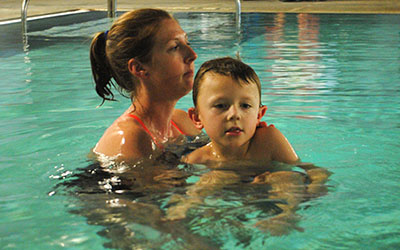Herndon Clinic makes big splash with aquatic therapy

08/05/16
By Randy Gonzales
University Relations and Marketing
HAYS, Kan. -- Harrison Urban's love of the water has turned into a learning tool.
Always looking to try something new at the Herndon Speech-Language-Hearing Clinic, assistant clinic coordinator Breanna Taylor tried using aquatic therapy with Harrison, the son of Blake and Theresa Urban, Hays. Taylor, with graduate clinician Sammy Ingham and Kelly Flaska, aquatic/fitness supervisor at The Center for Health Improvement, teamed up this summer to combine speech therapy with aquatic therapy with Harrison.
The Herndon Clinic, located on the campus of Fort Hays State University, is the only university-affiliated clinic in western Kansas. The Herndon Clinic was named a RiteCare Clinic in 2008 and is sponsored by the Scottish Rite Foundation of Kansas. This was the first time the clinic had tried aquatic therapy.
"I know they're constantly trying to get us experiences that are different and really real-life," said Ingham, a Fort Hays State graduate student in speech language pathology from Bonney Lake, Wash. "I knew I loved the Herndon Clinic when I came to visit. I moved to Kansas from Washington to be a part of this program."
Ingham planned the lessons, with Harrison -- a 5-year-old with Autism Spectrum Disorder -- receiving therapy both in and out of the pool. The lesson plan -- with pictures and descriptions -- detailed what was expected of Harrison.
"Probably the most beneficial thing we saw was that we used a social narrative, which basically is a story that tells him what is going to happen," Taylor said.
Before each session cards are given to Harrison to help him remember to sit while waiting for the session to start, that he takes a shower, and that he would sit again while waiting for the aquatic instructor.
Harrison's grandmother, Karla Flipse, who took Harrison to the pool for the sessions, noticed a difference in him during the sessions.
"Every time we went and he knew there were going to be the things we're going to go through, he said them verbatim," Flipse said, "because he was so excited to get into the pool."
Flipse noticed a change in her grandson not only during the sessions, but later, too.
"When he was in there he did a lot more talking," Flipse said. "Afterwards, we would usually go get a snack and he would be talking again -- quite a bit.
"Sometimes the words are hard to come by," she added. "But after the swimming experience he would tell me I want this or I want that. It was very rewarding, a very good experience for him."
Getting Harrison to become more socially engaged was part of the plan.
"At first, we tried to put games into the pool, see how he would do with that," Ingham said. "Towards the end we were trying to do routines to get him to engage, make eye contact, share smiles.
"It was just really cool to see how much he loved it, and he was engaged," she added. "In the past he had the therapy in the clinic. It's hard for him to have eye contact, share the smiles, because you have to be engaged first to start communicating. It was great to see how he would hold eye contact, share smiles, have back-and-forth interaction."
Flaska, a Fort Hays State alum who graduated in 2004, said getting children in the pool can often be beneficial.
"I think anytime you can work with children in the water, it's good," she said. "Especially helping the children that have a special needs situation, because they seem to enjoy the water."
Taylor said the clinic could use aquatic therapy again.
"I think we're definitely open to it," Taylor said. "Kelly Flaska was amazing; she was very patient. She was genuinely interested in knowing how she could help Harrison. We would love to partner with her again."
Flipse said a positive experience was provided for her grandson.
"He really flourished with it," Flipse said. "They are so good, and the students are very, very good. He liked going there."